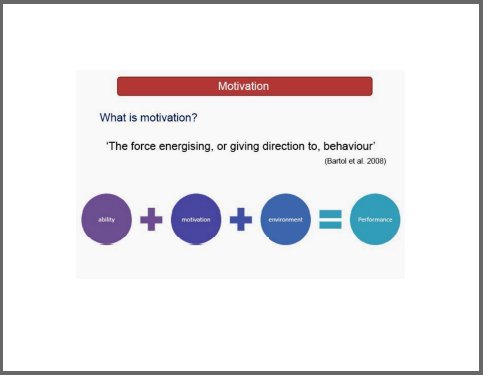|
Motivation theoriesHow to get people to take action and work towards a goal
Motivation theories can be broadly divided into 2 categories [at least from a change management perspective] namely: (1) Content theories that define motivation in terms of satisfaction of needs. (2) Process theories that define motivation in terms of a rational cognitive process.
(1) Content theories of motivation
Human beings have wants and desires which influence their behavior. Only unsatisfied needs influence behavior, satisfied needs do not. Since needs are many, they are arranged in order of importance, from the basic to the complex. The person advances to the next level of needs only after the lower level need is at least minimally satisfied. The further the progress up the hierarchy, the more individuality, humanness and psychological health a person will show. The needs, listed from basic (lowest-earliest) to most complex (highest-latest) are as follows:
Frederick Herzberg's two-factor theory This is another of the well known motivation theories [it is also known as intrinsic/extrinsic motivation] and concludes that certain factors in the workplace result in job satisfaction, but if absent, lead to dissatisfaction. The factors that motivate people can change over their lifetime, but "respect for me as a person" is one of the top motivating factors at any stage of life. He distinguished between: Motivators(e.g. challenging work, recognition, responsibility) which give positive satisfaction, and Hygiene factors (e.g. status, job security, salary and fringe benefits) that do not motivate if present, but, if absent, result in demotivation. The name Hygiene factors is used because, like hygiene, the presence will not make you healthier, but absence can cause health deterioration. The theory is sometimes called the "Motivator-Hygiene Theory" and/or "The Dual Structure Theory." Herzberg's theory has found application in such occupational fields as information systems and in studies of user satisfaction and as such is regarded as one of the mainstream motivation theories. Clayton Alderfer developed and simplified Maslow's Hierarchy into a shorter set of three needs: Existence, Relatedness and Growth ['ERG']. However, unlike Maslow, he saw these as a continuum rather than a hierarchy. Existence At the basic level is the need to stay alive and safe, now and in the foreseeable future. This includes Maslow's physiological and safety needs. Relatedness When we feel safe and secure, we deal with our social needs and are now interested in relationships with other people and our status from which we derive a sense of identity and position within our immediate society.This includes Maslow's love/belonging and esteem needs. Growth Ultimately we seek growth and self creative expression both for ourselves and for our environment. When we are successfully growing, we feel a sense of wholeness, achievement and fulfilment. This includes Maslow's self-actualization and transcendence. David McClelland's Acquired Needs Theory This theory [also known as the Three-Need Theory or Learned Need Theory] states that needs are formulated over time by our experiences. We will tend to have one of these needs that affects us more powerfully than others and thus affects our behaviors, and they fall into three general categories of needs: (1) Achievement Achievers seek to excel and appreciate frequent recognition of how well they are doing. They will avoid low risk activities that have no chance of gain. They also will avoid high risks where there is a significant chance of failure. (2) Affiliation Affiliation seekers look for harmonious relationships with other people. They will thus tend to conform and shy away from standing out. The seek approval rather than recognition. (3) Power Power seekers want power either to control other people (for their own goals) or to achieve higher goals (for the greater good). They seek neither recognition nor approval from others -- only agreement and compliance.
(2) Process motivation theoriesProcess motivation theories define motivation in terms of a rational cognitive process. In summary this theory is about a balance between give and take thus people prefer it when the give and take are about equal in a relationship.
In summary this theory is about how we create expectations about future events and assses their value and then assess our liklihood of achieving those expectations
Further Resources
Motivation in the workplace - People are motivated when they are inspired Maslow's hierarchy of needs - A paradigm shift ERG Theory - Practical application to leading change Herzberg Motivation Theory - Satisfied and motivated Acquired Needs Theory - Goal seeking achievers Process theories of motivation - Personal needs drive behaviour Employee motivation techniques - How to achieve peak performance Myers Briggs Personality Types - Why so importantInspirational motivation - How to inspire your people in tough times
|









